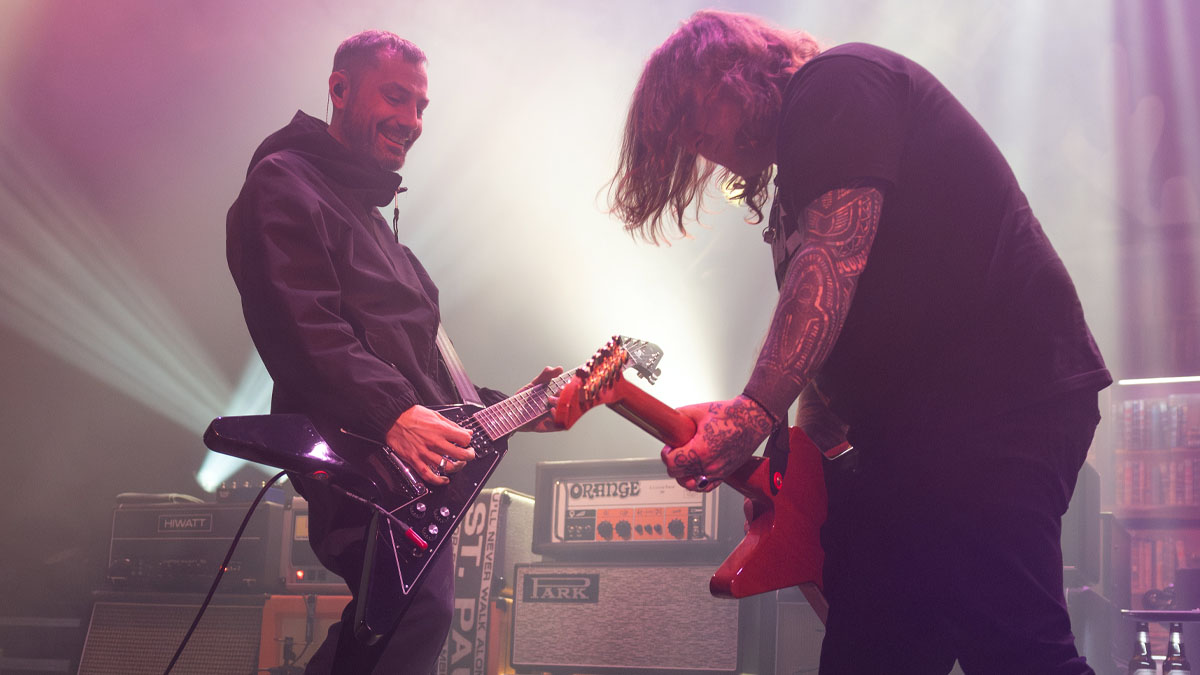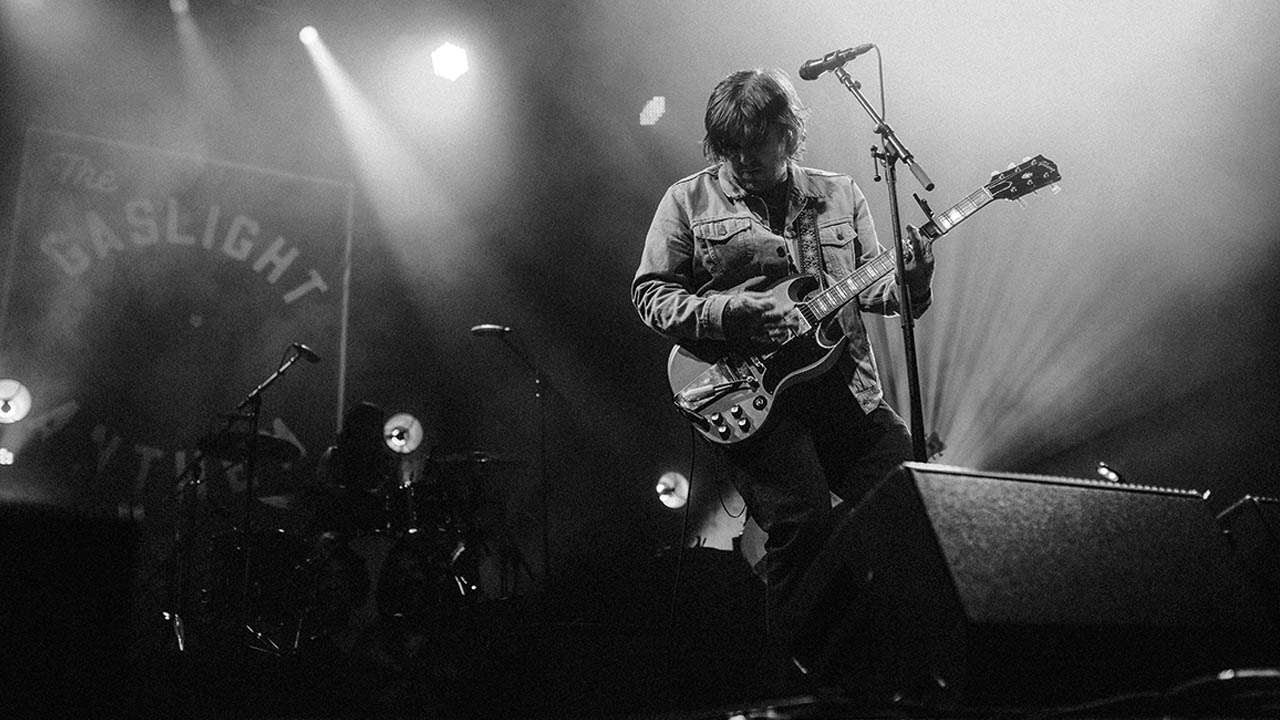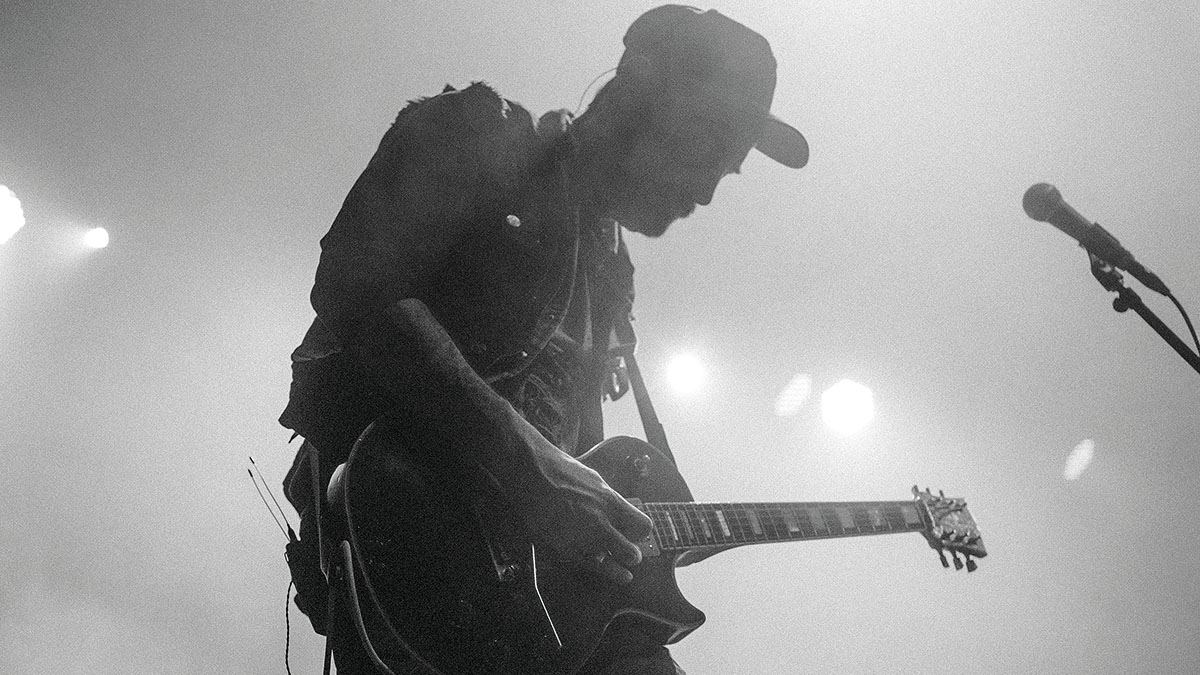
Just think for a moment on how a year of life feels, how things change, how you change, and then think what nine years of living feels like. That’s the time and distance The Gaslight Anthem put between the release of 2014’s Get Hurt and current album History Books.
During their hiatus, declared in the summer of 2015, life marched on relentlessly. For one thing, frontman/guitarist Brian Fallon had a solo career to launch, releasing four albums in the interim.
Gaslight, for their part, did get back together just three years later to mark the 10th anniversary of the New Jersey rockers’ landmark release, The ’59 Sound. Even if only unconsciously, this yawning gap in Gaslight history needed addressing before officially executing a comeback, when it was time to really get the band back together, ie, in a studio, with new material and a vision, and the collective pursuit of an album to deliver to a label and the fans. It’s the sort of thing you’ve got to puff out the cheeks and get serious about.
“When I sat down and thought, ‘Uh-oh! Gotta write a Gaslight Anthem album. Ha! And it’s gotta be good!’ That’s tough,” says Fallon.
“This one was us trying to figure out what we sounded like now, but including all of the elements we have ever had. Like a lot of bands try to run away from whatever it was they were before – and I have done that myself – but if you try and embrace everything that you are and just maybe shine a light on one side of it, or a different perspective, it only takes a small change for people to notice.”
Which is to say that History Books has its surprises but is not going to leave anyone with a black eye and hurt feelings from a wicked curveball. This is Gaslight exploring their centre of musical gravity, a band who graduated from the American punk-rock scene to become heirs apparent to Bruce Springsteen’s role as commander-in-chief of blue‑collar rock songs that can reach, inspire and affect all demographics.
That exalted status is all but anointed on History Books by a guest spot from The Boss himself on a title track that lays bare the The Gaslight Anthem’s sound and ethos.
Everything you ever needed to understand them is right here, the full emotional range, from haunting and elegiac Michigan, 1975 to the wide open spaces and constant movement of Autumn, and it is also a showcase of some of the guitar sounds that had the most profound influence on Fallon and lead guitarist Alex Rosamilia in their formative years.
Positive Charge was the first song that came together, and it betrays that with an exhalation from the guitars, as though they’re in a hurry to get started, and is lit up by a lead that has all the organic, earthy, almost-edible quality of a J Mascis [Dinosaur Jr.] tone.
“That’s what we were going for. You nailed it,” Alex says. “On the lead, that’s the Hizumitas from EarthQuaker Devices. It is Wata from [Japanese sludge band] Boris’s fuzz. It just cuts. I don’t want to say it’s touchy but the dial definitely changes the tone drastically, as I found out later on tour! If that knob is not exactly where it is supposed to be, it’s like super-bassy or super-thin, kind of buzzsaw-y. In a good way!”

He is not wrong. Set just right and the Hizumitas Fuzz Sustainar is a gourmet proposition. It tone rears its head again on I Live In The Room Above Her, making for a case study in how Gaslight’s guitarists mesh together on record and enrich the guitar textures, with Fallon complementing Rosamilia’s Hizumitas with a vintage Big Muff on the riff. By any metric, History Books is a lot of electric guitar.
“On this record we have got a lot of guitar stuff on it, nods to indie bands, and those Sub Pop bands that we grew up listening to,” Brian says. “There is a nod to that but it doesn’t sound like them – it still sounds like The Gaslight Anthem, and that’s why we have Bruce on the record and not J Mascis!”
Some of the inspirations behind the guitar-centric approach are less obvious. Def Leppard, and in particular the late Steve Clark’s era of the band in the early ’80s, is an influence percolating deep in the background.
“Steve Clark is someone who we don’t really talk about when talking about guitar heroes,” Alex says. “He’s another one of those guys. He’s one of the reason why I’ve gravitated to Les Pauls and a heavier sound…”
Going back to the “before times”, as Alex puts it, the primordial influences, was a reminder of the sorts of things that made them want to pursue this life in the first place. Fallon, similarly, saw gold in the stone-washed blue-denim sound of Sheffield’s biggest rock export.
“I love Def Leppard! Hysteria is a great record,” he says. “We’ve been really going back to our hardcore guitar lesson days. Everybody has been leaning that way. I’ve got this playlist that I made that’s got, like, Slade, T. Rex and Cheap Trick, and all this stuff that, when I was a kid, I learned to play guitar to.
“Nirvana were not around when I first started learning guitar, so you’d learn all the ’70s stuff. Zeppelin was too hard for me and, also, I didn’t like The Lord of the Rings! I was just into make-up and dressing up like KISS – a Starchild or a Demon. ‘Yeah, that’s for me!’ With a guitar on fire? I wanted that.”
On the advice of producer/engineer Peter Katis, Fallon leaned on some vintage grunge songwriting conceits for tracks such as Spider Bites, which works the quiet/loud spectrum with verse sections that sound as though he is performing in the eye of the storm, the persistent thump of Alex Levine’s bass in the background before the heavy weather rolls in for the chorus.
For Spider Bites, the real trick there was to stop playing. Because a lot of times people say, ‘Well, what can I do here?’ But sometimes, if you say, ‘What can I take out here?’ it makes it a lot better
Brian Fallon
“For that one, the real trick there was to stop playing,” Brian explains. “Because a lot of times people say, ‘Well, what can I do here?’ But sometimes, if you say, ‘What can I take out here?’ it makes it a lot better. The best thing we could think of to do was to just drop out and let the bass and drums take it, which is something we don’t really do a lot. But I was listening to a ton of Nirvana at the time, and that’s Nirvana’s thing, just bass and drums and then all of a sudden the guitar comes in and it sounds like a landslide.”
Spider Bites is one of those tracks that Gaslight really let bloom. It is typical of how they avoid overcrowding the arrangement. That can be more difficult when they’re playing live with Ian Perkins on guitar and Bryan Haring on keys and there are just more frequencies bouncing around.
But with Fallon and Rosamilia never playing the same part in unison, with so much distance between the pair’s guitar, they have the freedom to explore different sounds knowing that it’s invariably going to sound bigger.
“It’s just something to be conscious of,” Alex says. “If Brian is below the 12th fret, I stay above the 12th fret. If Brian is above the 12th fret I stay below the 12th fret. That’s a simplification of how it works. The way Brian plays a song when he shows it to us is a certain way, and I’ll try to make sure that I am writing a different part next so that we don’t step over each other. You get a bigger sound.
With Brian already playing the guitar, what am I in all of this? My guitar is either like the horn section or the back-up singers
Alex Rosamilia
“Not to get all ‘woo-woo’ on everything,” he continues, “but music is supposed to be this thing that moves you in an emotional sense, so I just feel for the emotion that Brian is going for and extrapolate on it in places where it seems like there is room for me. That’s how I approach it. Like this punk-rock Sam Cooke thing, using a lot of soul stuff as an influence.
“With Brian already playing the guitar, what am I in all of this? My guitar is either like the horn section or the back-up singers. I would try to play my parts like my guitar was the Supremes to Brian’s Diana Ross.”
As an additional comparison, he refers to past and present members of Springsteen’s E Street Band, saxophonist Clarence Clemons and guitarist ‘Little’ Steven Van Zandt. “I see my guitar doing more what Clarence does as opposed to what Little Steven does, right?”

Often Rosamilia will forego chords and tease out melodic ideas instead, or will play an octave when the song calls for it, and octaves can have that illusive quality of sounding wider and more spacious than single notes.
The Gaslight Anthem’s sound – further bolstered for live performance by additional touring guitarist Ian Perkins – is an illusion of space in which the moving parts don’t call attention to themselves. It’s clever. It even blows Springsteen’s mind.
“That’s always the thing that comes up when I talk to Bruce about our sound,” Brian says. “He always says to us, ‘You guys have so much space, but there’s so much going on. I don’t understand. How do you guys get so much space in there?’ And I’m like, ‘I don’t really know.’ But we don’t play the same parts, so if I am playing a chord, like the way I play a chord is very different from the way Ian will play a chord – and I don’t even know if Alex has ever played a chord in the band!”
History Books is a recording of constant movement. Fallon has spoken before about The Gaslight Anthem’s sound being built for the road, long trips on the two-lane black-top, and so it is here, where even in reflective, intimate arrangements there may be a quarter or eighth-note pulse holding down a rhythmic momentum that scarcely yields.
Fallon and Rosamilia say this has got to be from making their bones in the punk scene, when the energy of those shows manifests itself in the tick of nervous energy and the irresistible urge to hold the crowd’s attention. Old habits die hard.
Gear is another means of putting some distance between Fallon and Rosamilia’s tones. For History Books, Brian used a Fender Jaguar, a Stratocaster and a Gibson ES-330 he borrowed from Katis, all going through an Orange Custom 50 through a 4x10 Marshall cabinet. There was no changing horses mid-stream.
“So much stuff is changing in recording that I tend to be the constant, where I tend to use one or two guitars, and the same amp, and then let everything around me change,” he says.
Alex leaned mostly on a Les Paul Custom and his Fender Deluxe, and a little Supro for when he wanted a stereo spread. He used a borrowed Gretsch, too. He also messed around on a Prophet synthesizer for The Weatherman, but when it comes to playing it live it will be on guitar and his rig will have changed.
He will be playing Flying Vs. There is now a Boss HM-2 Heavy Metal on his pedalboard to see if can perform a similar function to the Hizumitas, only being a little more forgiving with the settings.
Fallon says they are always switching things out. “Oh, constantly. Some people use one guitar, one amp, and then ‘This is what I am going to use for the rest of my life’ and I am like, ‘No!’ We change it up as much as we can.”
The way Brian Fallon tells it, it kind of sounds like marriage counselling for player and instrument – how to maintain the spice in your relationship – that speaks to the romance of The Gaslight Anthem. He has similar advice for rock bands, too: a little less conversation, more action. “We don’t say anything to each other!” He says. “That’s what you should do in bands. Talk less. Say less and just play.”
- History Books is out now via Rich Mahogany Recordings.







